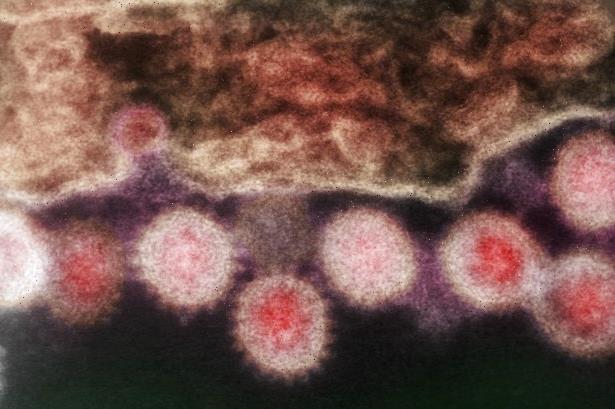A CASE of Crimean-Congo haemorrhagic fever has been identified in England, health officials have revealed.
The risk to the public is very low, the UK Health Security Agency said today – after the case was diagnosed in a woman who had travelled to Central Asia.
The illness is a viral disease that's usually transmitted by ticks and livestock.
It's usually found in countries where the disease is in an endemic state and the virus is endemic in all of Africa, the Balkans, the Middle East and in Asia.
The woman had visited Central Asia and was diagnosed at Cambridge University Hospitals NHS Foundation Trust.
She is currently receiving care at the Royal Free Hospital in London.
Read more on infections
New warning that Victorian killer disease could return due to Covid
Warning over deadly Heartland virus found on ticks as experts reveal bite signs
Dr Susan Hopkins, Chief Medical Advisor at UKHSA said: “It’s important to be aware that Crimean-Congo haemorrhagic fever is usually spread by tick bites in countries where the disease is endemic, it does not spread easily between people and the overall risk to the public is very low.
“We are working with NHS EI to contact the individuals who have had close contact with the case prior to confirmation of their infection, to assess them as necessary and provide advice.
“UKHSA and the NHS have well established and robust infection control procedures for dealing with cases of imported infectious disease and these will be strictly followed."
The doctor treating the patient, said she is in a high isolation unit.
Most read in Health
TOTAL TRAGEDY 
I was told my kids wouldn't live past 10 – my world was turned upside down

Popular fizzy drinks could increase the risk of deadly cancers, study finds

Aspiring model, 27, died of cancer after doctor said her hormones were to blame

Daily Covid cases up 98k as health chief urges Brits to get spring booster NOW
Dr Sir Michael Jacobs, consultant in infectious diseases at the Royal Free London, said: "The Royal Free Hospital is a specialist centre for treating patients with viral infections such as Crimean-Congo haemorrhagic fever.
"Our high level isolation unit is run by an expert team of doctors, nurses, therapists and laboratory staff and is designed to ensure we can safely treat patients with these kind of infections.”
The main carriers of the virus are Hyalomma ticks.
These are not found in the UK and the virus has never been detected here through a tick.
Prior to the case revealed in Cambridge, there have been just two cases of Crimean-Congo haemorrhagic fever detected in the UK.
What is Crimean-Congo haemorrhagic fever?
Crimean-Congo haemorrhagic fever (CCHF) is carried by ticks and picked up from cattle, sheep and goats.
It can be transmitted to people by ticks, or through coming into contact with infected animal blood.
Human-to-human transmission is possible, and happens when a person comes into contat with the blood and bodily fluids of people infected with CCHF.
After a person is bitten by an infected tick, it can take one to three days before symptoms appear.
But, the incubation period is five to six days, and can be up to 13, if you come into contact with infected blood or body tissues.
Symptoms appear suddenly and include:
- fever
- muscle aches
- dizziness
- neck pain and stiffness
- backache
- headache
- sore eyes
- sensitivity to the light
Infected people will also likely suffer:
- sickness and vomiting
- diarrhoea
- stomach pain
- sore throat
After two to four days, mood swings and confusion will be replaced by sleepiness and depression.
Other signs can include a fast heart rate, enlarged glands and a rash, caused by bleeding into the skin, as well as severe nosebleeds and bleeding gums.
Severely ill patients will suffer rapid kidney failure, sudden liver and heart failure, around five days after falling ill.
CCHF is deadly in around a third of cases, causing death around two weeks after falling ill.
It's endemic in many countries in Africa, the Middle East, Eastern Europe and Asia.
And outbreaks have been reported in Russia, Turkey, Iran, Albania, Pakistan and southern Africa in recent years
The last one was detected in 2014, and prior to that, a case had been detected in 2012.
There was no evidence that these cases caused any further transmission.
People who contract the illness with have sudden onset symptoms with initial signs including headache, fever, back pain, joint pain, stomach pain and vomiting.
These key signs are similar to that of Ebola.
In severe cases of Crimean-Congo haemorrhagic fever, people may also suffer changes in mood and sensory perception.
Read More on The Sun
Chelsea takeover cut down to TWO bidders with Blues fan Coe still in running
Drivers face £200 fine from today for just TOUCHING their phone
People who visit or who live in endemic areas should use protective measures to avoid contact with ticks.
These measures include avoiding areas where ticks are abundant at times when they are active, using tick repellents and checking clothing and skin carefully for ticks.
We pay for your stories!
Do you have a story for The Sun news desk?
Email us at [email protected] or call 0207 782 4104. You can WhatsApp us on 07423 720 250. We pay for videos too. Click here to upload yours
Click here to get The Sun newspaper delivered for FREE for the next six weeks.
Source: Read Full Article





